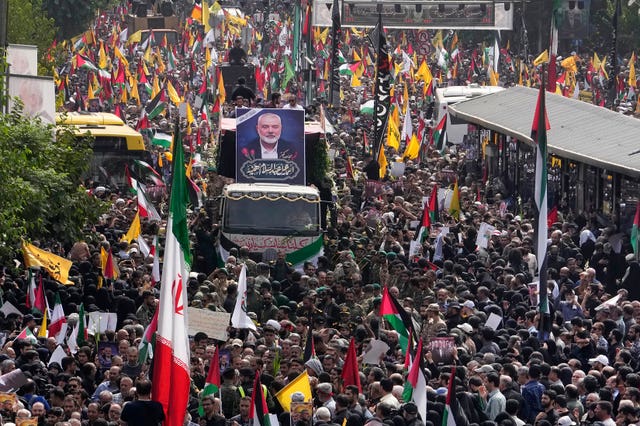Iran’s supreme leader and representatives of Palestinian militias he backs prayed on Thursday over the coffins of Hamas leader Ismail Haniyeh and his bodyguard who were killed in an assassination blamed on Israel that risked escalating into an all-out regional war.
Ayatollah Ali Khamenei prayed over Mr Haniyeh’s coffin at Tehran University while Iran’s new president Masoud Pezeshkian stood next to him. State television later showed the coffins placed in a truck and moved on the street toward Azadi Square in Tehran and people throwing flowers at them.
After the funeral services in Tehran, Mr Haniyeh’s remains are to be transferred to Qatar for burial on Friday.
Mr Haniyeh came to Tehran to attend the inauguration of Mr Pezeshkian. Associated Press photos showed the Hamas leader seated alongside leaders from the Palestinian Islamic Jihad militant group and Hezbollah, and Iranian media showed him and Mr Pezeshkian hugging. Mr Haniyeh had met earlier Ayatollah Khamenei.

Hours later, he was killed in an airstrike that hit a residence Mr Haniyeh uses in Tehran. Iranian authorities said the attack is under investigation but have not provided details.
Israel had pledged to kill Mr Haniyeh and other Hamas leaders over the group’s October 7 attack on southern Israel that sparked the war in Gaza. The strike came just hours after Israel targeted a top commander in Iran’s ally Hezbollah in the Lebanese capital Beirut.
Iran supports Hamas, as well as Hezbollah and other Palestinian militant groups fighting Israel in Gaza.
US Secretary of State Antony Blinken said “all parties” in the Middle East must avoid escalatory actions that could plunge the region into further conflict.
Speaking in the Mongolian capital of Ulaaanbataar on Thursday, Mr Blinken appealed for countries to “make the right choices in the days ahead” and said a ceasefire between Israel and Hamas in Gaza was the only way to begin to break the current cycle of violence and suffering.
Mr Blinken did not mention Israel, Iran or Hamas by name in his comments.
Bitter regional rivals, Israel and Iran risked plunging into war earlier this year when Israel hit Iran’s embassy in Damascus in April. Iran retaliated, and Israel countered in an unprecedented exchange of strikes on each other’s soil, but international efforts succeeded in containing that cycle before it spun out of control.
During Mr Pezeshkian’s inauguration ceremony, in his speech, he spoke in support of Palestinians, saying: “Iran demands a world where no Palestinian child’s dreams are buried under the rubble of their home.”
“We are seeking a world where the proud people of Palestine are freed from occupation, oppression and imprisonment and genocide,” Mr Pezeshkian said.
On Thursday, Iran’s Revolutionary Guard said that an Iranian military adviser died in the Israeli airstrike in Beirut earlier in the week that killed a senior Hezbollah commander.
In a statement on its website, the Guard identified the adviser as Milad Bidi, saying he had been operating in Syria and Lebanon. The Guard has advisers in both countries working with key allies Hezbollah, the Syrian government and other militias.
The Guard did not specify the day of the strike that killed Mr Bidi, but Tuesday evening’s attack was the only Israeli strike hit in the Lebanese capital since January. The strike hit a building in a Beirut suburb, killing Hezbollah commander Fouad Shukur, along with at least five civilians.
Mr Shukur’s funeral was set to take place on Thursday in Beirut.
Singapore said it is deeply concerned about developments in the Middle East, including the killing of Mr Haniyeh, who was involved in negotiations for a ceasefire in Gaza.
“This puts at risk efforts to secure a ceasefire agreement that would allow for the release of all hostages and facilitate humanitarian assistance to the civilian population,” the Foreign Ministry said in a statement.
Singapore called on all parties to take steps to de-escalate tensions to avoid a wider regional conflagration.





Comments: Our rules
We want our comments to be a lively and valuable part of our community - a place where readers can debate and engage with the most important local issues. The ability to comment on our stories is a privilege, not a right, however, and that privilege may be withdrawn if it is abused or misused.
Please report any comments that break our rules.
Read the rules hereLast Updated:
Report this comment Cancel